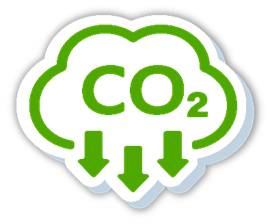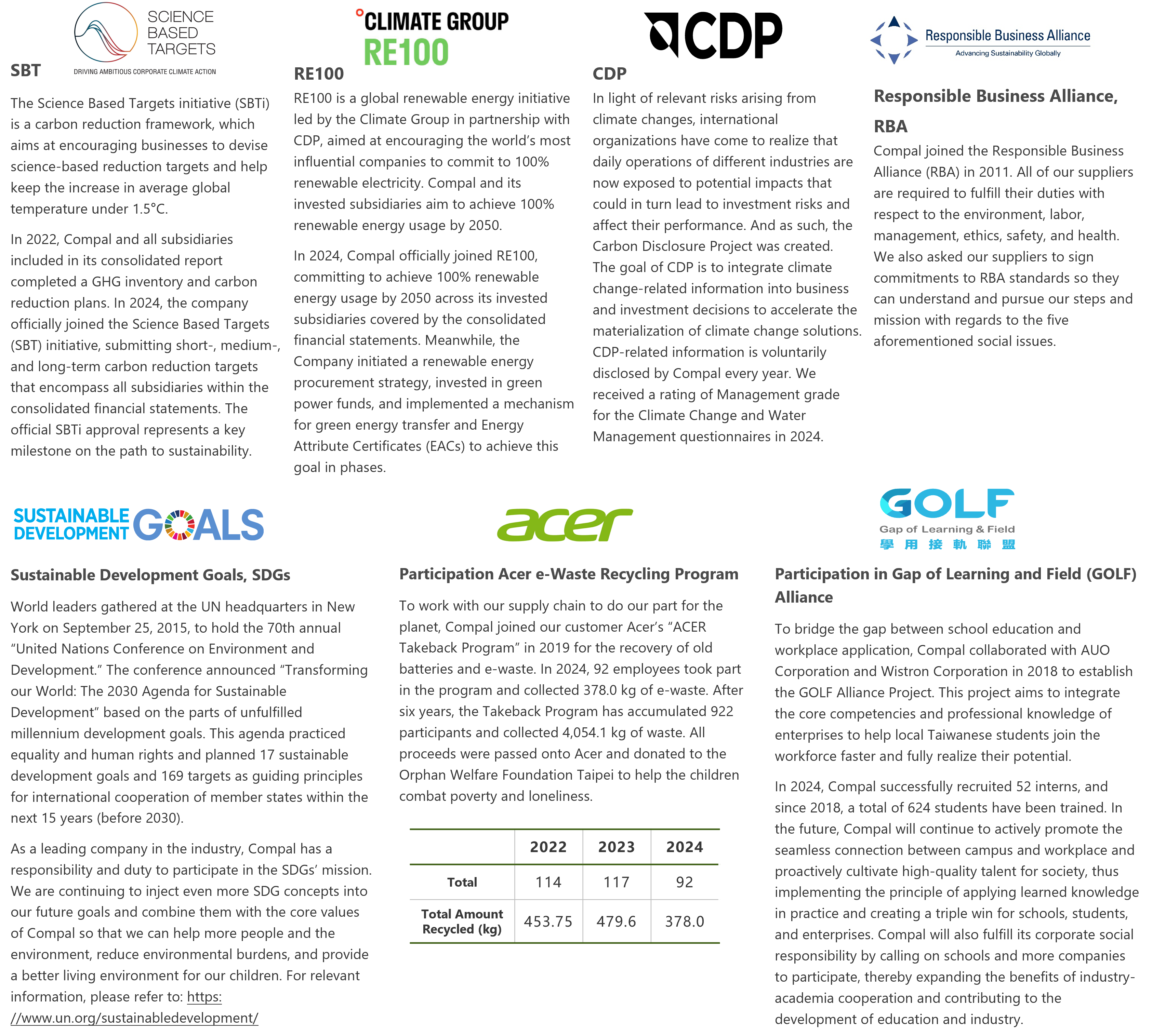Environmental Sustainability & External Advocacy
 Overall Environmental Sustainability Philosophy
Overall Environmental Sustainability Philosophy
Compal is committed to reducing the environmental impact of its operations, to build a company-wide environmental sustainability management framework. In accordance with the “ESG Sustainable Development Action Plan for TWSE and TPEx-Listed Companies” issued by the Financial Supervisory Commission (FSC), Compal has completed greenhouse gas inventories with subsidiaries included in consolidated financial statements and has passed the ISO 14064-1: 2018 standard with third-party independent verification to ensure the accuracy and credibility of environmental data.
To enhance environmental governance efficiency and data integration, Compal launched the Compal Cloud for Sustainability in 2024 as the central hub for group-level environmental management. This platform integrates environmental performance data on carbon emissions, energy, water, and waste, supports each site in target setting, implementation tracking, and performance feedback. It establishes a standardized framework for localized action, and enhances consistency and real-time responsiveness in environmental management.
To improve resource efficiency and target management, Compal sets clear short-term environmental performance targets, requires each department to reduce electricity intensity, water intensity, and waste emission intensity by 1% per year. Through management mechanisms such as internal audits, performance reviews, and training, Compal ensure that each location enacts improvements according to the action plan, gradually achieving an efficient, low-carbon, and environmentally friendly operation.
Compal Environment Sustainability Policy
Compal is dedicated to balancing environmental, social, and economic development, pursuing “Sustainable Environment” and “Responsible Manufacturing” through strategies in “Climate Change Mitigation and Adaptation,” “Water Resourve Management,” “Energy Management,” and “Waste Management” to actively reduce environmental impact and achieve sustainability goals.
Environment” and “Responsible Manufacturing” through strategies in “Climate Change Mitigation and Adaptation,” “Water Resourve Management,” “Energy Management,” and “Waste Management” to actively reduce environmental impact and achieve sustainability goals.
Compal's Commitments:
- Comply with environmental regulations and require suppliers, contractors, and logistics partners to follow our lead.
- Senior management leads environmental management units to set annual targets and action plans, with regular tracking to ensure performance achievement.
- Promote employee environmental education to enhance awareness and engagement.
- Establish transparent communication mechanisms to convey Compal’s environmental sustainability philosophy to internal and external stakeholders.
- Water resource management (WASH): Ensure all operational sites provide employees with safe drinking water, adequate sanitation facilities, and basic hygiene supplies. Adhere to international WASH (water, sanitation, and hygiene) standards to improve workplace hygiene and water use efficiency.
Policy implementation and management:
♦ Green Products and Services: Develop environmentally friendly products and promote the circular economy.
♦ Green Manufacturing and Operations: Optimize processes to reduce resource consumption, adopt automation and renewable energy, and minimize waste emissions.
♦ Green Transportation and Logistics: Reduce packaging, enhance transport efficiency, and minimize energy and resource consumption during transportation.
♦ Green Partners and Cooperation: Select supply chain partners with environmental commitments and align sustainability standards with merged or acquired entities. Compal will continue aligning with international standards, leveraging data-driven decision-making and innovative management to advance environmental sustainability and collaborate with the supply chain toward a net-zero future.
Compal will continue aligning with international standards, leveraging data-driven decision-making and innovative management to advance environmental sustainability and collaborate with the supply chain toward a net-zero future.
Green Product Design: Introduce central concepts of sustainable thinking.
Compal views green product design as the cornerstone of sustainable thinking. From the development stage, Compal considers the environmental impact across the entire product lifecycle—design, production, transportation, use, and disposal—strives to reduce resource consumption and carbon footprint at every stage, thus fulfilling responsibilities to the environment and users.
Environment Sustainability Management
Although Compal does not belong to high-energy-consumption or high-water-consumption industries, we remain committed to monitoring the negative environmental impacts of our operations and actively improving the efficiency of energy, water use, reducing the waste of various resources, lowering emissions of waste and pollutants to achieve the goal of environmental sustainability. The company has established a series of short-term goals and strategies, including a 1% reduction in electricity, water usage, and waste intensity compared to the previous year. These goals are implemented through regular tracking and verification to ensure effective environmental performance management. Moreover, to thoroughly implement Compal’s environmental sustainability management philosophy from top to bottom and continuously reduce the consumption of various resources and optimize their usage efficiency, we regularly conduct educational training. This helps communicate our environmental management objectives to all employees, enhancing their awareness of energy conservation, water conservation, waste reduction, and green product design and manufacturing, thereby realizing various action plans for environmental sustainability management.
Responding to International Advocacy and Cooperative Actions
Compal is actively responding to international climate and sustainability initiatives by engaging in practical participation, disclosure, and collaborative projects. The company promotes climate governance mechanisms and accountability practices both internally and externally, while establishing a long-term action framework aligned with Sustainable Development Goals (SDGs). Compal is also proactively involved in international governance, policy collaboration, and industry initiatives. With a better understanding of the nature and objectives of each engagement, external collaborative actions are categorized into responses to international governance initiatives, customer collaboration participation, academic-industry cooperation initiatives, and supply chain engagement:
